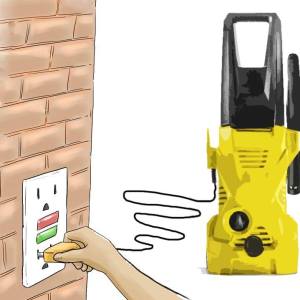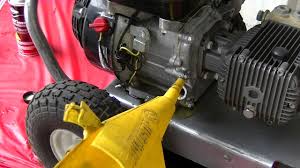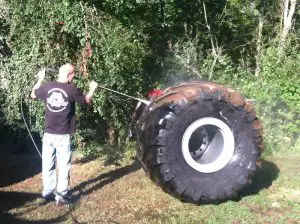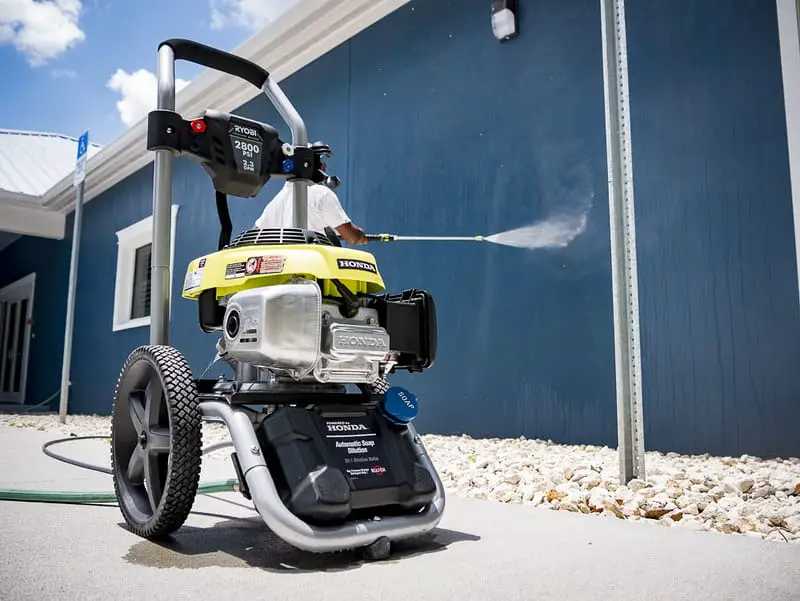Slippery mildew and peeling paint on the deck.
Motor oil stains and grease on the driveway.
Carbonized cookout detritus stuck on your grill.
It takes a lot of time and labor to get rid of the stubborn dirt and stains from surfaces.
There’s an answer for that – pressure washers!
Two Manufactured Home Pressure Washer Options: Ten Shopping Factors
To choose the best pressure washer competent enough for demolishing all the muck and stains you couldn’t remove with a brush, bear in mind these factors:
1. Type/Source of Power
Pressure washers can be split into 2 groups based on the source of power –
- gas
- electric washers.
There are still more differences between these two besides their source of power:
2. Pressure Amount
Perhaps the most noticeable difference between gas and electric pressure washers is the size of pressure delivered by either type.
The pressure acting on a surface is measured in PSI / pound a square inch.
A high PSI value indicates that the pressure acting on the surface is great.

Most of the electric pressure cleaners you will find in the store fall in the bracket of 500 – 2000 PSI, meaning you can easily choose the appropriate device for your light-duty tasks.
But things can be slightly different if you are looking for a more advanced machine.

Gas pressure washers, on another hand, typically feature between 3000 and 4000 PSI – they rarely fall past 2500 PSI.
That’s a lot of cleaning power and it means one thing – gas pressure washers offer the best solution for heavy-duty cleaning tasks!
3. Cost
The cost of the machine is a major factor for many buyers.
Electric pressure cleaners are quite budget-friendly compared to gas options.
However, when it comes to durability, gas pressure washers are known to outlast their electric counterparts.
4. Durability
Let’s revisit the above point – gas and electric pressure cleaners last differently.
Gas pressure washers typically last longer because their parts are easily replaceable.
Electric pressure cleaners are harder to repair and, for that reason, don’t last.
Let’s take a glance at the benefits and drawbacks of each:
Electric Pressure Cleaners

Pros
Great for typical home use
They are perfect for most home cleaning tasks including washing the patio, siding, and decks, and even cars.
The pressure is enough to provide a satisfactory scrub without inflicting damages although you still need to select the lowest pressure possible.
Convenient
If convenience is your priority then you can bet on electric pressure cleaners as they are more lightweight, meaning they are simple to maneuver.
They are also compact enough to be stored in small spaces. Lastly, and importantly, they aren’t as noisy as their gas counterparts.
Eco-friendly
Unlike gas pressure washers, they don’t burn fuel, which means they don’t release pollutants into the environment.
Affordable
They cost much less compared to gas options. You can find a decent product with a price tag below $100.
No hidden costs
Unlike gas pressure washers, you don’t pay to plug your cleaner on the power outlet – once you purchase it, you are done paying for it
Cons
Less cleaning power
Perhaps the biggest setback about these cleaners is that they aren’t as powerful as their gas-powered counterparts.
This means you will struggle to blast away the stubborn stains and dirt from surfaces.
Not durable
If you compare them to gas pressure cleaners, they aren’t long-lasting and this means you will spend extra money on repair, frequent maintenance, or early replacement.
Limited operating range
Another top drawback with these devices is that they must be plugged into the electrical outlet to function. This can limit your cleaning range.
Gas pressure cleaners

Pros
Ultimate cleaning power
Gas pressure cleaners are the most powerful of the two types.
They normally peak at 4000 PSI – this wild pressure is perfect for heavy-duty cleaning.
You probably don’t need a detergent
Since the pressure is enormous, you don’t need to use a detergent to complete a thorough cleaning.
Fast
They are time savers, allowing you to clean large surfaces in a short time.
If you are looking for a cleaner that’s good for business, you should try out gas pressure cleaners.
Highly durable
They come with a high upfront cost but lasts longer than electric cleaners.
Cons
Heavy and noisy
While gas pressure cleaners typically come with wheels, they aren’t the easiest equipment to move between places as they are heavy.
Also, the noise produced by the engine may easily upset your silence-loving neighbors
High running costs
They need to be fed with fuel and oil from time to time.
The cost of these can add up to a fortune in the long run.
Expensive
Gas pressure cleaners aren’t the most affordable washing equipment out there, more so if you compare them to their electric counterparts.
5. The PSI rating (Power)
Let’s talk PSI (or pressure power).
The PSI rating indicates the power of the device.
Therefore, just because you own a gas pressure cleaner doesn’t mean you have the most powerful device.
Besides PSI, pressure cleaners show their power through GPM rating (gallons per minute).
If the PSI and GPM ratings are high, it means the cleaner is fast at the job and costs more as well.
Use these two ratings to balance your power needs and what you are willing to spend on the specific device.
Based on PSI and GPM ratings, pressure cleaners can be split into three broad categories:
Light-Duty
These are best at completing small cleaning jobs around your home.
The power ranges between 1300 and 1900 PSI at about 2-GPM.
They are mostly compact and lightweight devices perfect for cleaning your patio furniture, vehicles, patios, decks, and grills small decks, and patios.
An example is Westinghouse ePX 1500 PSI Pressure Cleaner.
Medium-Duty
These pressure washers are a little more powerful than light-duty devices and produce between 2000 and 2800 PSI at 2 – 3 GPM.
They are the best option for shop and home use.
You will have an easier time cleaning relatively large spaces such as driveways or walkways, thanks to their sturdier build.
Greenworks are known for their cutting-edge medium-duty cleaners, including this 2000 PSI 1 Gallon Electric Pressure Washer.
Heavy-Duty & Extra-Heavy-Duty
They are the most powerful pressure washers out there, delivering over 2800 PSI at 3 – 4 GPM. All commercial-grade pressure cleaners are placed in this category, beginning from 3100 PSI.
They are durable machines designed for the most demanding large-scale cleaning tasks, including washing storied buildings, graffiti removal, and paint-stripping.
A good example is this SIMPSON Megashot 3100 PSI 2 Gallon Cold Water Gas Pressure Cleaner.
Check out these heavy-duty cleaners.
In one of your shopping trips, you realize that these cleaners can also be divided into two groups based on the temperature of water –
- hot
- and cold water.
Cold-Water Pressure Washers
If you are looking for the perfect pressure cooker for washing your car or any other DIY cleaning tasks, choose a cold water machine.
These pressure cleaners are cheaper than hot-water washers and are recommended for minor cleaning assignments.
Hot-Water Pressure Washers
They are designed for heavy-duty cleaning assignments mostly in farms and industrial settings.
They use hot water, are costly, and require expertise to operate.
If speed is your priority, you should buy a product from this category. They also use fewer cleaning chemicals, including detergent.
Note: You can’t use hot water in a cleaner designed for cold water, neither can you use cold water in a hot-water washer.
6. Type of Nozzle
Consider the kind of nozzle on the machine of your liking.
Pressure washers come with 2 types of nozzles:
- a unit of interchangeable nozzles
- or a wand-like all-1 spray handle.
The latter lets the user adjust the pressure of the water pressure by twisting a twist or a set of interchangeable nozzles (more on this later).
7. Pressure Washer Features
Just like any other equipment, you want a product with specific features that will either make operation easier or accomplish tasks that may be impossible with certain products.
Look for these features in a pressure cleaner:
Amps (A)
This is a must-check in electric pressure washers – the Ampere ratings show the power output of the model
Cubic Centimeters (cc)
This is a must-check for gas pressure cleaners – the cc ratings indicate the power output of the device
Axial Cam Pump
It is found on virtually all pressure washers meant for homeowners. It ensures you have an easy time with pump operation
Triplex Pump
Most of the pressure cleaners intended for frequent industrial and commercial use comes with triplex pumps.
Their job is simple – to give your machine a longer lifespan and help the machine operate with better efficiency
Rotating Nozzles
Accessories that spray in a powerful circular motion
Adjustable Wands
These accessories permit the user to alter the pressure and spray pattern without changing the tip of the nozzle
Thermal Relief and Unloaders
Look for these design features if you don’t want heat or pressure buildup in the device
8. Warranty
Pressure washers aren’t cheap.
You also want a product that will return the value of your money and deliver the service reasonably longer.
That’s why you need to consider the warranty of the cleaner.
Warranties normally indicate the quality and even possible durability of a machine – the longer the warranty, the more confidence the manufacturer has in the product, hence the longer it might last trouble-free.
However, there is more than one type of warranty.
Don’t be carried away by the length of the warranty.
Check what the warranty covers.
Does it cover the pump and the engine or just the frame?
You will be surprised by how some makers choose to phrase their warranty. Whichever way they phrase it, make sure it covers the pump and the engine.
9. Portability
The portability of the machine is important.
Choose a cleaner that is easy to wheel around the place and store.
Few things are as disappointing as purchasing a machine you thought would be perfect for your needs only to turn out to be heavy and hard to move between places.
Machines with hoses that won’t roll over without pain can be a real ordeal.
Choose a product designed with ease of use and ergonomics in mind – this extends beyond gripped and comfortable handles.
For example, if you are tall or very short, go for the right length of the handle or, better yet, opt for a machine with an adjustable handle.
What may be comfortable or easy for one person, might not be comfortable or easy for another person.
So don’t take anyone’s word for it.
Walk into the store, inspect the models of your liking, and try them. If you must wheel one around the store or outside, go ahead and do it – just make sure it meets your comfort expectations.
10. Accessories
There are multiple types of attachments the user can add to the pressure cleaner to help with more specialized cleaning.
Brushes are appropriate for scrubbing away the tough grime and dirt on surfaces.
There are situations you will need to use a spinning jet to add a sparkle on your sidewalks and driveway.
Angled wands help you clean your gutters and all the sides you couldn’t reach with a regular straight wand.
Surface cleaners use spinning jets to clean driveways and sidewalks.
Spray tips and extension wands are perfect for those hard-to-reach areas on your home’s surfaces.
To cut the long story short, check out whether the washer supports additional accessories especially those of your interest.

Frequently Asked Questions
Q: Can you put bleach in your pressure washer?
In one word – “NO!”
Never use any of your regular household bleaches with your pressure cleaner.
Why?
These machines come equipped with delicate o-rings and seals in the wand, gun, hoses, and pump.
Exposing these parts to bleaching chemicals will certainly destroy them and create a need for an expensive replacement for the machine to work seamlessly again.
Q: What’s a good PSI for pressure washing?
Your PSI choice will depend on an array of factors including the state of the surface you plan to wash and just how safe you want the cleaning exercise to be.
A big part of the pressure washers you will find out there deliver between 1300 and 2400 PSI and about 1.5 GPM.
Experts recommend that you use a machine rated anywhere between 2000 and 3000 PSI and with at least 2.5 GPM.
Machines in this range can perform most larger home cleaning projects without the need for supplementary cleaning. I
f you choose to go with an electric washer, it would prudent to choose from the upper side of the margin, anywhere close to 2400 PSI.
Q: What are the different pressure washer nozzles?
Pressure washers are equipped with two types of nozzles –
- an all-in. -1 variable spray wand (designed to allow you to adjust the pressure of the water with a simple twist)
- and a set of several interchangeable nozzles.
Here are the different pressure settings:
0° (red nozzle)
This is the farthest you can go. It is the most powerful and concentrated nozzle setting you could choose
15° (yellow nozzle)
This is the setting you’d use for thorough heavy-duty cleaning both at home and in commercial establishments
25° (green nozzle)
This is less intense than the above and is used for moderate-intensity and general cleaning
40° (white nozzle)
This is perfect for vehicles and easily damaged surfaces such as patio furniture and your boat
65° (black nozzle)
This is the lowest you could go. It is mostly used in low-pressure applications that need to be accompanied by soap and other washing chemicals
Q: Is it ok to run a pressure washer without water?
No, it isn’t.
While you can start your pressure cleaner without water, it’s never a good idea and experts strongly advise against it.
Without running water, even for a few seconds, the pump will work harder than it’s supposed to operate and this will certainly cause damages in the long run.
Remember that the main job of the pump is to suck water from the reservoir or supply hose and eject it out via the nozzle.
Q: What should you NOT DO with a pressure washer?
There are a lot of things you should never do with your pressure washer, like putting your fingers or palm in front of the nozzle to feel the pressure.
Here are others:
- NEVER use your machine to wash living things – we mean dogs, cats, livestock, and even trees.
- NEVER use the machine on paintwork that you want to last
- NEVER use the machine on windows – believe it or not, high pressure can break glass windows!
- NEVER use the machine on a stained wooden surface. It will strip off your beautiful stain if you do.
- NEVER use hot water if it was designed for cold water; the same applies to hot water pressure cleaners with cold water – don’t!
Also, just to emphasize, never place your hand in front of the nozzle to test the pressure.

